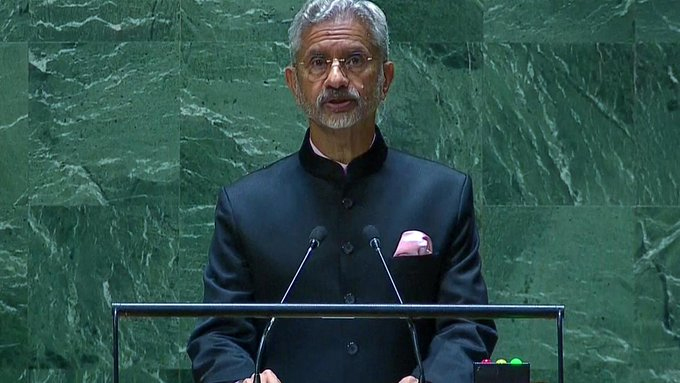news details |
|
|
| India-China relations in 'Abnormal State' since Galwan Valley clash: Jaishankar | | |  agencies agencies
NEW YORK, Sept 27: India-China relations have been in an "abnormal state" since the 2020 Galwan Valley clash and it is a "possibly longer than medium-term issue", External Affairs Minister S Jaishankar has said, emphasising that none of the explanations given by Beijing for amassing its troops along the LAC are really tenable.
India has been consistently maintaining that the situation at the border in eastern Ladakh is not normal and that peace and tranquillity along the Line of Actual Control (LAC) were key for the normalisation of overall bilateral ties.
If the two biggest countries of the world have that degree of tension between them, "it has consequences for everybody else", Jaishankar asserted during a conversation at the Council on Foreign Relations to a question about India-China relations.
"You know, one of the pleasures of dealing with China is that they never quite tell you why they do things. So you often end up trying to figure it out. And it's always, there's a certain ambiguity out there," Jaishankar, who was India's Ambassador to China from 2009 to 2013, said.
"At various points in time, the Chinese have given us different explanations, and none of them are really tenable," Jaishankar said.
Indian and Chinese troops are locked in an over three-year confrontation in certain friction points in eastern Ladakh even as the two sides completed disengagement from several areas following extensive diplomatic and military talks.
"It is very hard to try to be normal with a country which has broken agreements and which has done what it has done. So if you look at the last three years, it's a very abnormal state," the minister said.
"Contacts have been disrupted, visits are not taking place. We have of course this high level of military tension. It has also impacted the perception of China in India," he said.
The perception was not positive in the 1960s and 70s because of the war in 1962. "But we had started to put that behind us when this happened," he said.
"So I think there's both an immediate issue, as well as a medium-term issue, possibly longer than medium-term issue out there," Jaishankar said.
The external affairs minister outlined a historical perspective on the relations between Delhi and Beijing, adding that it has never been easy.
"It had a war in 1962. It had military incidents after that. But after 1975, there's never been a combat fatality on the border, 1975 was the last time," he said, adding that in 1988, India normalised the relationship more when then Prime Minister Rajiv Gandhi visited China.
Jaishankar further pointed out that in 1993 and 1996, India made two agreements with China to stabilise the boundary, which is disputed. "So there's a negotiation going on."
He said it was agreed that neither India nor China would actually amass troops at the Line of Actual Control and if either side brought more than a certain number of troops, it would inform the other side. "So it was pretty explicit the way it was laid out," the minister said about the two agreements.
Jaishankar added that there have been subsequent agreements after that and it was a "very unique situation" because, in the boundary areas, troops on either side would step out of their designated military bases, do their patrolling and return to their bases. |
|
|
|
|
|
|
|
|
|
|
|
|
| |
| |
|
|
|
|
 |
|
|
|
|
STOCK UPDATE |
|
|
 |
| BSE
Sensex |
 |
| NSE
Nifty |
|
|
| |
CRICKET UPDATE |
|
|
|
|
|
| |
| |
|
|
| |
|
|
|
|
| |
|
|
|
|
|
|
|
|
|
|
|
|
|
